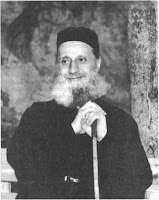What is Jesus Prayer
It is so short! It is a repetition of these words: “Lord Jesus Christ, have mercy on me.”
What happens when we repeat it
We acquire a spiritual dynamism that does not come from us, but from God Himself.
It is comprehensive
It comprises the divinity. It includes Christ Himself, Who immediately enters into communion with our hearts.
It’s habit forming
This invocation helps us to acquire a habit, so that the remembrance of Christ within us becomes unceasing. So everything around us and inside our hearts becomes filled with God.
Not magical formula or mechanical work or psycho-somatic exercise
…about which one might think that it has access to a kind of gnostic or syncretic knowledge… or that this exercise would bring spiritual results… or that through this formula, man can tend towards infinity or to a faceless god. The repetition is just an intensification, and a focusing, and a rooting of the Name of Christ and thus of Christ Himself, in our daily lives.
What does it do?
It creates within man the power to unceasingly invoke God, and therefore, the human participation, offers him a state of joy and spiritual happiness, and other charisms. And then, when man reaches this primary stage, well, he understands that Holy Spirit mediates between his personality and the Personal God!
It is, I would say, the only prayer which, clearly creates our preconditions to be able to find God daily, and also, easily, to find Him and rejoice in God. Through this prayer, the One Who is unseen becomes visible in our lives.
What is its purpose?
It is what is being worked by God in you. What God works in our inner being… What He works is an experience. But it is not only the experience of God! It is also a revelation of the way He comes, of how the coming of God happens. The Personal God within the human personality… And of course, He comes in Light! And one still feels and understands at the end of his or her ascent, the union which is performed… And with this union, the purification comes, the spiritual advancement comes, the growth of the little baby which is being born into man.
The purpose of Prayer, in a word, we could say, is a perfect mystery of the unseen God, the One now felt, and the visible person… a mystery performed by God. This mystery has been revealed to us by the Fathers of the Church. We also know from experience, always, how to become a recipient of God. Not through reasoning and meditation, but in a way that God penetrates the human person, and transforms it entirely. And so, he or she becomes a person who can taste, understand and comprehend this mystery.
It is a continuous climb
It is an ever-rising communion, perfect, unchanging. I mean, no person changes, neither one, nor the other. There is a divine vision and a communion with the unseen.







